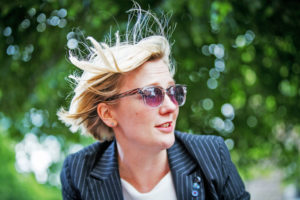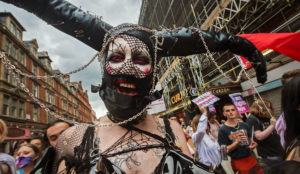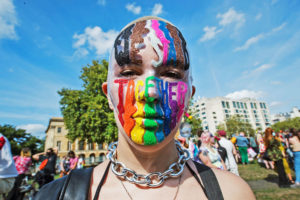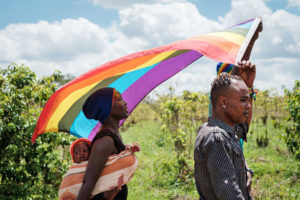These days, a woman who calls herself a lesbian invites suspicion. Over the past 20 years, bars, bookstores, and festivals, once set aside for women attracted to other women, have rebranded themselves as “trans-inclusive” or “queer”, shut down, or gone underground. Lesbian playwrights such as Carolyn Gage see their plays shelved. Lesbian role models such as Ellen (now Elliot) Page come out as transgender. Even gender-nonconforming girls and women from the past fall victim to the new gender creed. Joan of Arc — the subject of Gage’s cancelled play — has undergone a posthumous transition nearly 600 years after she was burned at the stake.
This month, media organisations and mega corporations will bend over backwards to find an LGBTQ angle to cover. But what you won’t see or hear is the underside of Pride: a culture of intense social and sexual pressure that’s pushing some lesbians back into the closet and encouraging others to identify out of womanhood altogether.
It started with the push to redefine “lesbian” to be inclusive of heterosexual males who identify as women. But it didn’t stop there. Now same-sex attraction is out, redefined as a problematic “genital preference”. A surprising number of hardline activists vilify lesbians as “genital fetishists” and accuse them of practising “sexual apartheid”.
Meanwhile, lesbians are bombarded with suggestions on “how to have lesbian sex with a trans woman”. Safe-sex guides for lesbians provide information on avoiding pregnancy and performing blowjobs. Healthline’s “How Do Lesbians Have Sex?” guide, which targets sexually inexperienced women and girls, reminds readers that “any person can have any type of sex”. “[D]on’t apply assumptions you apply to cis men to us, our body works in different ways,” a columnist for Allure scolded readers: “Keep an open mind, and remember you’re having sex with a woman who knows more about her body than you do about hers.”
Not convinced yet? “Estrogenized dicks are… a lot like if a vagina was shaped like a dick and testes… Sex with an estrogenized dick is its own experience, but it’s MUCH MORE like sex with a vagina than sex with a man’s dick!” This remarkable advertisement concludes with a denial of what’s being pushed and why:
“Don’t have sex with anyone you don’t want to! You don’t ever have to give a reason why you don’t want to have sex with someone… But if you go out of your way to tell everyone that you won’t have sex with trans women, and your reasoning is that you think trans women are men, and that sex with us is like sex with men, don’t be surprised when people call you out as an uninformed bigot!”
Or, as one “trans lesbian” put it: “Being shut off from the very idea of it, not even considering that having my penis inside you is different from having a man’s penis inside you? That hurts.”
Somehow, telling lesbians that they “just haven’t tried the right dick yet” went woke.
Young lesbians get the message — from their peers in the “queer” community, their role models in arts and culture, the media, and medical providers — that their discomfort with any of this means that they may really be straight men trapped in gay women’s bodies. Sometimes, adopting an idiosyncratic gender identity — like “transmasc non-binary who’s attracted to women” or “feminamoric” — may be the only way a young woman can set boundaries around her sex life.
Last year, two friends and I launched Unspeakable LGBTQ. We asked: What do you wish you could say about your experiences as a woman in the LGBTQ community?
Some women talked about intense pressure to identify out of womanhood. When femininity — not sex — makes someone a “woman”, women who don’t conform to stereotypes come under scrutiny: “I wish I could talk about how non-conforming women are being pressured to identify as a different gender to validate transwomen’s ‘femininity,’” wrote one respondent. “Feeling alienated by femininity is a near-universal female experience, especially for gay and bisexual women — not something that means you’re not a woman at all,” wrote another. Another respondent confessed that she now feels “more comfortable around my conservative neighbors than I do in ‘queer’ liberal circles because my neighbors call me a lesbian and a woman… [in the LGBTQ community] I’ve had people ask me if I am truly non-binary or a trans man because I have short hair and don’t wear makeup or dresses.”
Relentless policing of lesbians’ sexual orientation and self-expression run through these stories. One woman compared the LGBTQ community today to her experience growing up in the Mormon religion, “where women are subservient in every way that matters”:
“We are allowed to have no leadership positions without the permission or surveillance of men, even in our own organizations… I was excited to join LGBT spaces and meet people like me. But it wasn’t like that. I left one cult and found out that what awaited me was another. In LGBT and other “progressive” circles, women don’t have the right to assemble without the presence of males who, by nature of being male, have no ability to relate to the experiences of female people. Just like my old religion, you aren’t allowed to question the ideology (in this case transgenderism) without being ostracized… Just like my old religion, men’s feelings and sensibilities must be taken into account in everything that women do.”
Another recalled her evangelical upbringing, writing: “I’d really really like, as a lesbian woman, to no longer be surrounded by transwomen who parrot the same talking points and shame tactics used, nearly word for word, by the youth pastor that tried to help me ‘pull away from sin’,” one woman wrote. “I never thought I would have to defend my sexuality against people in the community”, said another. “I get to feel wrong for how I am and how I love all over again.”
One university student described her brief involvement with the LGBTQ community on campus: “I hoped to meet other same-sex attracted people in the ‘lgbtq+’ club at my new university. It was not a community. There were some gay men and some lesbians, but there were also men who told me to my face that they were lesbians. That I should ‘be open to penis’. That I was a bad person for being a lesbian. I didn’t stay.” Another respondent admitted, “I forced myself to date trans women because I was made to feel like I was a bigot for not being attracted to them as a lesbian. It was incredibly traumatic and I was treated like utter crap.”
Responding to a climate where women who dissent from gender identity ideology face threats of violence, one woman wrote: “I want to talk about the incredible setbacks we’ve made in both women’s rights and same-sex rights without people threatening to beat, rape, or kill me.”
For women who have firsthand experience identifying as transgender or transitioning — before deciding to desist or detransition — the LGBTQ community reinforces patterns of thinking that caused distress and harm. One detransitioned woman reflected:
“I spent years running from being a butch lesbian. I transitioned in order to escape the shame & fear I had. When I finally came to terms with the fact that transition had not really helped & I was still the same me I detransitioned… I wanted community more then anything. But there isn’t a place for me anymore. Before I transitioned there were several lesbian groups in my area. They aren’t here anymore. As far as I can tell there is no lesbian space or group anywhere in my area… I can not express how painful it is to not have a place to belong.”
One of the most wrenching submissions was also the simplest and shortest — speaking to something the community at large seems to have forgotten: “there is nothing wrong with women who are only attracted to the female body.” An LGBTQ community in thrall to gender identity and “trans inclusivity” necessarily sacrifices belonging and acceptance for same-sex attracted women.
For women who want to be part of the LGBTQ community, there’s no escaping gender identity ideology. “The problem with leaving the ‘trans cult’ as a lesbian is that you can never really leave,” one young desisted woman wrote. “The ideology is in every LGBT space, every LGBT charity, every dating site, on the front page of our news sites every single day.”
In other words, you can accept yourself as a lesbian. You can desist or detransition from a trans identity. You can accept your sex and your sexual orientation. But if you want to stand under that rainbow flag, you’re not allowed to say so.
Disclaimer
Some of the posts we share are controversial and we do not necessarily agree with them in the whole extend. Sometimes we agree with the content or part of it but we do not agree with the narration or language. Nevertheless we find them somehow interesting, valuable and/or informative or we share them, because we strongly believe in freedom of speech, free press and journalism. We strongly encourage you to have a critical approach to all the content, do your own research and analysis to build your own opinion.
We would be glad to have your feedback.
Source: UnHerd Read the original article here: https://unherd.com





